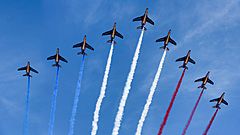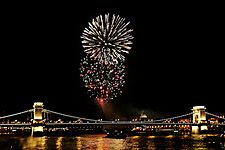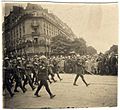Bastille Day facts for kids
Quick facts for kids Bastille Day |
|
|---|---|
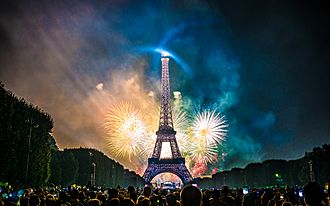
|
|
| Also called | French National Day (Fête nationale) The Fourteenth of July (Quatorze juillet) |
| Observed by | France |
| Type | National Day |
| Significance | Commemorates the Storming of the Bastille on 14 July 1789, and the unity of the French people at the Fête de la Fédération on 14 July 1790 |
| Celebrations | Military parades, fireworks, concerts, balls |
| Date | 14 July |
| Frequency | annual |
Bastille Day is the special national holiday of France, celebrated every year on July 14th. In French, it's officially called Fête nationale, which means "National Celebration."
This day marks two important events in French history. It's the anniversary of the Storming of the Bastille on July 14, 1789. This event was a big moment in the French Revolution. It also celebrates the Fête de la Fédération, which happened on July 14, 1790. This celebration showed the unity of the French people. People all over France celebrate this day with many fun activities. One of the most famous events is a large military parade in Paris. It takes place on the Champs-Élysées and is known as one of the oldest and biggest military parades in Europe. The President of France and other important guests watch the parade.
Contents
What Happens on Bastille Day?
The Big Military Parade
The Bastille Day Military Parade is a grand show of France's military strength. It starts with students from famous military schools like École Polytechnique and Saint-Cyr. Then, different types of soldiers march, followed by vehicles. Above them, planes from the Patrouille de France aerobatics team fly, creating colorful smoke trails.
Sometimes, soldiers from other countries that are friends with France are invited to join the parade. For example, in 2004, British troops marched to celebrate 100 years of friendship between France and the UK. In 2013, soldiers from Mali led the parade. Even the United Nations Secretary General, Ban Ki-moon, attended the parade in 2013.
The President's Interview
On Bastille Day, the President of France usually gives an interview to reporters. They talk about what's happening in the country and plans for the future. Some presidents, like Nicolas Sarkozy, chose not to do this, but others, like François Hollande, brought the tradition back.
Why is Bastille Day Celebrated?
The Storming of the Bastille in 1789
In 1789, the people of France were unhappy with their king, Louis XVI of France. On July 11, the king fired a popular minister named Jacques Necker. This made the people of Paris very worried. They feared the king's army would attack them. They also needed weapons and gunpowder.
So, on July 14, 1789, a large crowd stormed the Bastille. The Bastille was a old fortress that was used as a prison. It was a symbol of the king's absolute power because he could jail people there without a trial. Even though there were only seven prisoners inside at the time, the Bastille held a lot of ammunition.
The crowd, joined by some soldiers, fought against the prison's guards. The commander of the Bastille, Bernard-René de Launay, eventually gave up. Sadly, fighting continued, and many people died, including de Launay.
Soon after this event, on August 4, the old system of feudalism (where lords controlled land and people) was ended. Then, on August 26, the Declaration of the Rights of Man and of the Citizen was announced. This important document said that all people have rights and are equal.
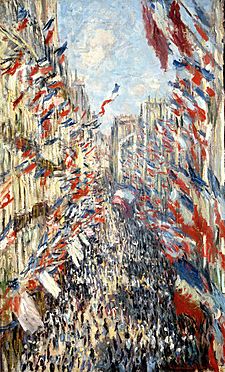
The Fête de la Fédération in 1790
The Fête de la Fédération was a huge celebration on July 14, 1790. It marked one year since the Storming of the Bastille. People thought the French Revolution was ending happily with a new constitutional monarchy.
The event took place on the Champ de Mars, a large field outside Paris. Thousands of people from Paris helped prepare the area, working together to get it ready. A special mass was held, and General Lafayette, a hero of the revolution, swore an oath to the new constitution. King Louis XVI of France also took the oath. After the official ceremony, there was a big four-day party with fireworks, music, and dancing in the streets. People felt very free and happy.
How Bastille Day Became a National Holiday
In 1878, a celebration was held in Paris to honor the French Republic. The next year, on July 14, 1879, another big event took place. There was a military review and many parties across France. People celebrated the Storming of the Bastille.
In 1880, a politician named Benjamin Raspail suggested making July 14th a yearly national holiday. The idea was approved by the French government. On July 6, 1880, it became official. The government asked everyone to celebrate the day with as much excitement as possible. The first official Bastille Day in 1880 was truly magnificent!
The Paris Military Parade's History
The Bastille Day Military Parade has been held in Paris every year since 1880. It used to be held in different places, but since 1918, it has taken place on the Champs-Élysées. The parade marches from the Arc de Triomphe to the Place de la Concorde. Here, the President of France, his government, and foreign guests watch. It's a very popular event in France and is shown on TV. It is the oldest and largest regular military parade in Europe. Sometimes, soldiers from other countries are invited to march, and foreign leaders attend as guests. Smaller parades are also held in other French towns.
Bastille Day Celebrations Around the World
Bastille Day is celebrated by French communities and friends of France all over the world!
- Belgium: The city of Liège celebrates Bastille Day every year. They do this because France honored Liège for its brave resistance during World War I.
- Czech Republic: In Prague, there's a French market called "Le marché du 14 juillet." It offers French food, wine, and music around July 14th.
- Hungary: Budapest has a two-day celebration supported by the French cultural center.
- New Zealand: The suburb of Remuera in Auckland hosts a French-themed street festival each year.
- South Africa: Franschhoek, also known as 'French Corner,' has celebrated a Bastille Day festival for over 15 years. The French Consulate in Cape Town also hosts a party.
- United Kingdom: London has a large French community and celebrates Bastille Day in places like Battersea Park.
- United States: More than 50 cities in the U.S. have annual celebrations!
- Baltimore has a big celebration at Petit Louis.
- Boston's French Cultural Center has hosted a celebration for over 35 years, often with French music, dancing, and food.
- Chicago has hosted various celebrations, sometimes sponsored by the French-American Chamber of Commerce.
- Dallas's "Bastille On Bishop" festival started in 2010. Dallas has French roots from a community formed in 1855.
- Houston celebrates at La Colombe d'Or Hotel, hosted by the French Consulate and other groups.
- Milwaukee has a four-day street festival that starts with a "Storming of the Bastille" event, featuring a 43-foot replica of the Eiffel Tower.
- Minneapolis has a celebration with wine, French food, and circus performers.
- New Orleans has multiple celebrations, especially in the historic French Quarter.
- New York City has many Bastille Day events, including "Bastille Day on 60th Street." The Empire State Building is lit up in blue, white, and red.
- Orlando has a street festival with champagne, music, and artists.
- Philadelphia's celebration at Eastern State Penitentiary includes a fun re-enactment of the Storming of the Bastille.
- Sacramento, California has "waiter races" and a street festival.
- San Francisco has a large celebration in its historic French Quarter.
- Seattle's celebration at the Seattle Center includes performances and picnics.
- St. Louis has festivals in its Soulard and Carondelet neighborhoods, sometimes with re-enactments.
Special Bastille Day Events
- 1979: A concert by Jean-Michel Jarre in Paris attracted one million people, setting a world record for the largest outdoor concert crowd.
- 1989: France celebrated 200 years since the French Revolution with a huge show on the Champs-Élysées.
- 1994: The military parade was led by Eurocorps, a new European army unit that included German soldiers. This was a big moment for French-German friendship.
- 1998: After France won the football World Cup, huge celebrations happened across the country on Bastille Day.
- 2004: To celebrate 100 years of friendship, British troops led the military parade, and the Red Arrows flew overhead.
- 2014: To mark 100 years since World War I began, representatives from 80 countries were invited to the ceremony.
- 2017: French President Emmanuel Macron invited American President Donald Trump to celebrate the long friendship between France and the United States.
Cool Facts About Bastille Day
- In 1790, the key to the Bastille prison was given to George Washington as a gift from Marquis de la Fayette. You can see it at Mount Vernon, Washington's home.
- In 2014, Barack Obama gave François Hollande a table made from wood from an Oak tree at Mount Vernon. It had a replica of the Bastille key in the middle!
- When the Bastille was stormed, there were only 7 prisoners inside, even though it could hold 50.
- There are many fun things to do on Bastille Day, especially in Versailles and at the Palace of Versailles, which attracts over 50,000 tourists.
- The Bastille Day Military Parade in Paris is the oldest military parade in Europe.
- The famous writer Voltaire was once a prisoner in the Bastille.
- After the Bastille was torn down, pieces of the fortress were sent around France. They were displayed as symbols of freedom from unfair rule.
Related pages
Images for kids
-
The French President traditionally welcomes honorary guests for the parade (here: Donald Trump in 2017)
-
Horseman of the Republican Guard during the 2007 military parade on the Champs-Élysées
-
Surgeon general inspector Dominique Vallet, head of the Laveran military medical school, at the ceremonies for Bastille Day in Marseille, 2012
See also
 In Spanish: Fiesta Nacional de Francia para niños
In Spanish: Fiesta Nacional de Francia para niños
 | George Robert Carruthers |
 | Patricia Bath |
 | Jan Ernst Matzeliger |
 | Alexander Miles |


